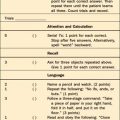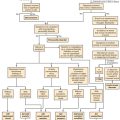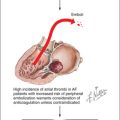CHAPTER 9 Coping with Medical Illness and Psychotherapy of the Medically Ill
OVERVIEW
Coping with illness can be a serious problem for both the patient and the physician. Indeed, the irony of our increasing prowess in healing is our growing discomfort and our profound sense of impotence when a cure cannot be found, and when coping is the order of the day. This dilemma is both consciously realized and unconsciously experienced; both patients and staff feel the ripple effect.1–3
WHAT EXACTLY IS COPING?
At virtually every step of patient care, physicians and patients alike actively appraise patient coping. Though this appraisal is not always conscious, it is clear that conclusions drawn about how a patient is processing his or her illness has great bearing on therapeutic decisions, the psychological well-being of the patient, and indeed of the overall course of the patient’s illness.1 However, accurate appraisal of coping skills is hampered by muddled definitions of coping, by competing standardized assessments, and by a general lack of conscious consideration of how patients cope and whether their particular coping styles are effective or helpful.4–7
Early conceptualizations of coping centered around the “Transactional Model for Stress Management,” put forth first by Lazarus and colleagues in the late 1960s.8 This conceptualization stressed the extent to which patients interact with their environment as a means of attempting to manage the stress of illness. These interactions involve appraisals of the current medical condition, with psychological and cultural overlay that varies from patient to patient. While this definition of coping persists to this day, many have argued that though it is a useful paradigm, it is also too broad to allow for standardized assessments in patient populations. Thus, while multiple studies of patient coping exist, most clinicians favor a more open-ended evaluation of each patient, taking into consideration the unique backgrounds that patient and doctor bring to the therapeutic setting.5
Coping is perhaps best defined as a problem-solving behavior that is intended to bring about relief, reward, quiescence, and equilibrium. Nothing in this definition promises permanent resolution of problems. It does imply a combination of knowing what the problems are and how to go about reaching a correct direction that will help resolution.1,6,7
In ordinary language, the term coping is used to mean only the outcome of managing a problem, and it overlooks the intermediate process of appraisal, performance, and correction that most problem solving entails. Coping is not a simple judgment about how some difficulty worked out. It is an extensive, recursive process of self-exploration, self-instruction, self-correction, self-rehearsal, and guidance gathered from outside sources. Indeed, these assertions were central to Lazarus’ initial conceptualizations.8
How anyone copes depends on the nature of a problem, as well as on the mental, emotional, physical, and social resources one has available for the coping process. The hospital psychiatrist is in an advantageous position to evaluate how physical illness interferes with the patient’s conduct of life and to see how psychosocial issues impede the course of illness and recovery. This is accomplished largely by knowing which psychosocial problems are pertinent, which physical symptoms are most distressing, and what interpersonal relations support or undermine coping.
WHO COPES WELL?
Few of us cope exceedingly well all of the time. For all of us, sickness imposes a personal and social burden, with accompanying significant risk and threat appraisal. Furthermore, these reactions are seldom precisely proportional to the actual dangers of the primary disease. Therefore, effective copers may be regarded as individuals with a special skill or with personal traits that enable them to master many difficulties. Characteristics of good copers are presented in Table 9-1.
WHO COPES POORLY?
Bad copers are not bad people, nor even incorrigibly ineffective people. In fact, it is too simplistic merely to indicate that bad copers have the opposite characteristics of effective copers. As was stressed earlier, each patient brings a unique set of cultural and psychological attributes to his or her capacity to cope. Bad copers are those who have more problems in coping with unusual, intense, and unexpected difficulties because of a variety of traits. Table 9-2 lists some characteristics of poor copers.
THE ROLE OF RELIGION
In some investigations, being at peace with oneself and with one’s sense of a higher power is predictive of both physical and psychiatric recovery.9,10 However, other studies have suggested that resentment toward God, fears of God’s abandonment, and a willingness to invoke Satanic motivation for medical illness were all predictive of worsening health and an increased risk of death.11
THE MEDICAL PREDICAMENT—BRINGING IT ALL TOGETHER
Coping refers to how a patient responds to and deals with problems that relate to disease, sickness, and vulnerability. In approaching chronically ill patients, it is helpful to conceptualize disease as the categorical reason for being sick, sickness as the individual style of illness and patienthood, and vulnerability as the tendency to be distressed and to develop emotional difficulties in the course of trying to cope.1
COPING AND SOCIAL SUPPORT
Social support is not a “sometime” thing, to be used only for the benefit of those too weak, needy, or troubled to get along by themselves. It requires a deliberate skill, which professionals can cultivate, in order to recognize, refine, and implement what any vulnerable individual needs to feel better and to cope better. In this light, it is not an amorphous exercise in reassurance but a combination of therapeutic gambits opportunistically activated to normalize a patient’s attitude and behavior. Techniques of support range from concrete assistance to extended counseling.12,13 Their aim is to help patients get along without professional support. Social support depends on an acceptable image of the patient, not one that invariably “pathologizes.” If a counselor only corrects mistakes or points out what is wrong, bad, or inadequate, insecurity increases and self-esteem inevitably suffers.
THE ASSESSMENT OF VULNERABILITY
Vulnerability is present in all humans, and it shows up at times of crisis, stress, calamity, and threat to well-being and identity.14–20
Table 9-3 shows 13 common types of distress. Table 9-4 describes how to find out about salient problems, the strategy used for coping, and the degree of the resolution attained.
| Hopelessness | Patient believes that all is lost; effort is futile; there is no chance at all; there is a passive surrender to the inevitable |
| Turmoil/perturbation | Patient is tense, agitated, restless, hyperalert to potential risks (real and imagined) |
| Frustration | Patient is angry about an inability to progress, recover, or get satisfactory answers or relief |
| Despondency/depression | Patient is dejected, withdrawn, apathetic, tearful, and often unable to interact verbally |
| Helplessness/powerlessness | Patient complains of being too weak to struggle anymore; cannot initiate action or make decisions that stick |
| Anxiety/fear | Patient feels on the edge of dissolution, with dread and specific fears about impending doom and disaster |
| Exhaustion/apathy | Patient feels too worn out and depleted to care; there is more indifference than sadness |
| Worthlessness/self-rebuke | Patient feels persistent self-blame and no good; he or she finds numerous causes for weakness, failure, and incompetence |
| Painful isolation/abandonment | Patient is lonely and feels ignored and alienated from significant others |
| Denial/avoidance | Patient speaks or acts as if threatening aspects of illness are minimal, almost showing a jolly interpretation of related events, or else a serious disinclination to examine potential problems |
| Truculence/annoyance | Patient is embittered and not openly angry; feels mistreated, victimized, and duped by forces or people |
| Repudiation of significant others | Patient rejects or antagonizes significant others, including family, friends, and professional sources of support |
| Closed time perspective | Patient may show any or all of the these symptoms, but in addition foresees an exceedingly limited future |
Table 9-4 Coping (To Find Out How a Patient Copes)
| Problem | In your opinion, what has been the most difficult for you since your illness started? How has it troubled you? |
| Strategy |
Adapted from Weisman AD: The realization of death: a guide for the psychological autopsy, New York, 1974, Jason Aronson.
HOW TO FIND OUT MORE ABOUT COPING
The assessment and identification of ways in which a patient copes or fails to cope with specific problems requires both a description by the patient and an interpretation by the psychiatrist. Even so, this may not be enough. Details of descriptive importance may not be explicit or forthcoming. In these situations, the clinician must take pains to elucidate the specifics of each situation. If not, the result is only a soft approximation that generalizes where it should be precise. Indeed, the clinician should ask again and again about a topic that is unclear and rephrase, without yielding to clichés and general impressions.
On the other hand, patients may attempt to disavow any role in their current illness. By seeking credit for having suffered so much, such patients reject any implication that they might have prevented, deflected, or corrected what has befallen them (see Table 9-4). Helping these patients does not necessarily require that they acknowledge their role in their particular predicament. Instead, the empathic listener identifies and provides comfort around the implicit fear that these patients harbor (i.e., that they somehow deserve their debilitation).
HOW TO BE A BETTER COPER
Coping with illness is only one special area of human behavior. It is important to recognize that in evaluating how patients cope, examiners should learn their own coping styles and, in effect, learn from patients. Clearly, it is not enough to mean well, to have a warm heart, or to have a head filled with scientific information. Coping well requires open-ended communication and self-awareness. No technique for coping is applicable to one and all. In fact, the concept of technique may be antithetical to true understanding. A false objectivity obstructs appraisal; an exaggerated subjectivity only confuses what is being said about whom.
1 Schlozman SC, Groves JE, Weisman AD. Coping with illness and psychotherapy of the medically ill. In Stern TA, Fricchione GL, Cassem NH, et al, editors: Massachusetts General Hospital handbook of general hospital psychiatry, ed 5, Philadelphia: Mosby, 2004.
2 Williams CM, Wilson CC, Olsen CH. Dying, death, and medical education: student voices. J Palliative Med. 2005;8(2):372-381.
3 Gordon GH. Care not cure: dialogues at the transition. Patient Educ Couns. 2003;50(1):95-98.
4 Orbach I, Mikulincer M, Sirota P, Gilboa-Schechtman E. Mental pain: a multidimensional operationalization and definition. Suicide Life Threat Behav. 2003;33(3):219-230.
5 Coyne JC, Gottlieb BH. The mismeasure of coping by checklist. J Pers. 1996;64(4):959-991.
6 Morling B, Evered S. Secondary control reviewed and defined. Psychol Bull. 2006;132(2):269-296.
7 Koch EJ, Shepperd JA. Is self-complexity linked to better coping? A review of the literature. J Pers. 2004;72(4):727-760.
8 Lazarus RS. Psychological stress and the coping process. New York: McGraw-Hill, 1966.
9 Laubmeier KK, Zakowski SG, Bair JP. The role of spirituality in the psychological adjustment to cancer: a test of the transactional model of stress and coping. Int J Behav Med. 2004;11(1):48-55.
10 Pargament KI, Koenig HG, Tarakeshwar N, et al. Religious struggle as a predictor of mortality among medically ill patients: a 2-year longitudinal study. Arch Intern Med. 2001;161:1881-1885.
11 Clarke DM, Mackinnon AJ, Smith GC, et al. Dimensions of psychopathology in the medically ill: a latent trait analysis. Psychosomatics. 2000;41:418-425.
12 Stauffer MH. A long-term psychotherapy group for children with chronic medical illness. Bull Menninger Clin. 1998;62:15-32.
13 Saravay SM. Psychiatric interventions in the medically ill: outcomes and effectiveness research. Psychiatr Clin North Am. 1996;19:467-480.
14 Bird B. Talking with patients, ed 2. Philadelphia: JB Lippincott, 1973.
15 Coelho G, Hamburg D, Adams J, editors. Coping and adaptation. New York: Basic Books, 1974.
16 Jackson E. Coping with crises in your life. New York: Hawthorn Books, 1974.
17 Kessler R, Price R, Wortman C. Social factors in psychopathology: stress, social support, and coping processes. Annu Rev Psychol. 1985;36:531-572.
18 Moos R, editor. Human adaptation: coping with life crises. Lexington, MA: DC Heath, 1976.
19 Murphy L, Moriarity A. Vulnerability, coping and growth. New Haven, CT: Yale University Press, 1976.
20 Weisman A. The coping capacity: on the nature of being mortal. New York: Human Sciences, 1984.





